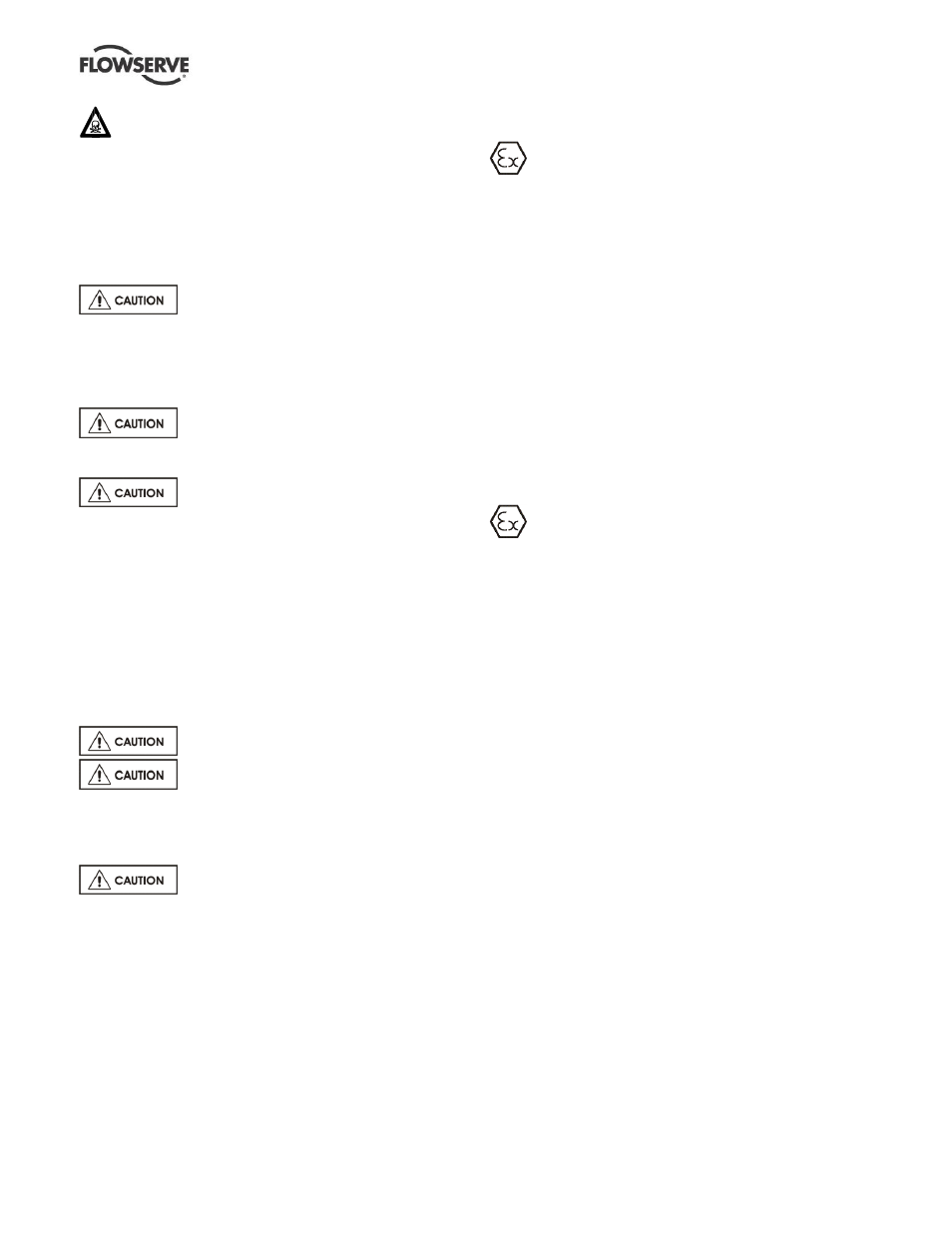Atex marking (1.6.4.2), Compliance, atex (1.6.4.1) – Flowserve LNN User Manual
Page 6

LNN, LNNV, LNNC USER INSTRUCTIONS ENGLISH 71569074 06-14
Page 6 of 56
flowserve.com
HAZARDOUS LIQUIDS
When the pump is handling hazardous liquids care must
be taken to avoid exposure to the liquid by appropriate
sitting of the pump, limiting personnel access and by
operator training. If the liquid is flammable and/or
explosive, strict safety procedures must be applied.
Gland packing must not be used when pumping
hazardous liquids.
PREVENT EXCESSIVE EXTERNAL
PIPE LOAD
Do not use pump as a support for piping. Do not mount
expansion joints, unless allowed by Flowserve in
writing, so that their force, due to internal pressure, acts
on the pump flange.
ENSURE CORRECT LUBRICATION
(See section 5, Commissioning, start up, operation and
shutdown.)
START THE PUMP WITH OUTLET
VALVE PARTLY OPENED
(Unless otherwise instructed at a specific point in the
User Instructions.)
This is recommended to minimize the risk of
overloading and damaging the pump motor at full or
zero flow. Pumps may be started with the valve further
open only on installations
where this situation cannot
occur. The pump outlet control valve may need to be
adjusted to comply with the duty following the run-up
process. (See section 5, Commissioning start-up,
operation and shutdown.)
NEVER RUN THE PUMP DRY
INLET VALVES TO BE FULLY OPEN
WHEN PUMP IS RUNNING
Running the pump at zero flow or below the
recommended minimum flow continuously will cause
damage to the seal.
DO NOT RUN THE PUMP AT
ABNORMALLY HIGH OR LOW FLOW RATES
Operating at a flow rate higher than normal or at a flow
rate with no back pressure on the pump may overload the
motor and cause cavitation. Low flow rates may cause a
reduction in pump/bearing life, overheating of the pump,
instability and cavitation/vibration.
1.6.4
Products
used in potentially explosive
atmospheres
Measures are required to:
Avoiding excessive surface temperature
Preventing build up of explosive mixtures
Preventing the generation of sparks
Preventing leakages
Maintaining the pump to avoid hazard
The following instructions for pumps and pump units
when installed in potentially explosive atmospheres
must be followed to help ensure explosion protection.
For ATEX, both electrical and non-electrical equipment
must meet the requirements of European Directive
2014/34/EU (previously 94/9/EC which remains valid
until 20 April 2016 during the transition). Always
observe the regional legal Ex requirements eg Ex
electrical items outside the EU may be required
certified to other than ATEX eg IECEx, UL.
1.6.4.1
Scope of compliance
Use equipment only in the zone for which it is
appropriate.
Always check that the driver, drive coupling
assembly, seal and pump equipment are suitably rated
and/or certified for the classification of the specific
atmosphere in which they are to be installed.
Where Flowserve has supplied only the bare shaft pump,
the Ex rating applies only to the pump. The party
responsible for assembling the ATEX pump set shall
select the coupling, driver and any additional equipment,
with the necessary CE Certificate/Declaration of
Conformity establishing it is suitable for the area in which
it is to be installed.
The output from a variable frequency drive (VFD) can
cause additional heating effects in the motor and so, for
pumps sets with a VFD, the ATEX Certification for the
motor must state that it is covers the situation where
electrical supply is from the VFD. This particular
requirement still applies even if the VFD is in a safe
area.
